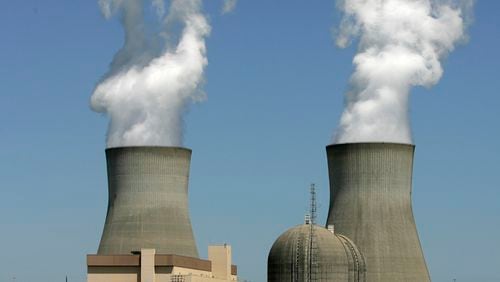The final House-Senate tax bill Republican leaders unveiled late Friday does not include a provision long sought by the backers of Georgia’ Plant Vogtle, adding even more uncertainty to the struggling nuclear project’s future.
Absent from the compromise legislation is language extending the nuclear production tax credit.
The tweak — which was included in the House-passed bill and would have eliminated the sunset date for tax credits given to new nuclear units put into operation after 2020 — would have netted the Augusta-area project about $800 million over several years. Vogtle’s operators have been counting on Congress to pass some version of the language since their balance sheets have long assumed they will see those federal benefits.
Construction of third and fourth reactors at Vogtle has been marred by cost overruns and delays that threaten the viability of the project. According to new estimates by Georgia Power, the two reactors which were supposed to be operational this year will be complete by 2022.
The news, first reported by Bloomberg, represents a major blow to the project less than a week before state utility regulators are scheduled to rule on its financial future. The Georgia Public Service Commission pushed up its vote regarding how much financial risk Vogtle’s operators can pass onto the public to Dec. 21 because of a separate corporate tax-related provision in the fast-moving tax bill.
A spokesman for Georgia Power said the company “continue(s) to actively support legislation that would allow the Vogtle project to continue to qualify for advanced nuclear production tax credits if the units are placed in service after January 1, 2021.”
“Although not included in the compromise bill, extension of production tax credits continues to receive bipartisan endorsement,” spokesman Jacob Hawkins said.
Members of Georgia’s congressional delegation had been pushing for the tax credit extension for months, although none served on the House-Senate conference committee that hashed out the bill’s final details. Several promised to fight on in the weeks ahead.
“I have been actively discussing this matter with constituent stakeholders as well as Senate and House leadership, and we are working on a path forward to get a nuclear tax credit extension passed this year or early next year,” said U.S. Sen. Johnny Isakson, R-Ga.
“Clearly, Plant Vogtle is critical and Congress should act on this important project soon,” said U.S. Sen. David Perdue, R-Ga.
Industry lobbyists said they were aiming to get similar nuclear language included in a year-end package of other energy tax credit extensions. Those so-called “extenders” could potentially be paired with a must-pass government spending bill next week, but it’s advancement is far from assured due to a multitude of external political factors.
Conservative groups have maintained in the past that the extenders should be eliminated because they constitute the government selecting winners and losers in energy markets.
Vogtle co-owner Oglethorpe Power said the legislation would “lower the cost of energy for consumers” and vowed to work with the state’s congressional delegation “to see the legislation enacted as soon as is feasible.”
Meanwhile, Georgia-based backers of Vogtle said they were disappointed by the news about the tax bill.
It “puts an already fragile project in even greater jeopardy,” said Tim Echols, a member of the Public Service Commission who has vocally backed the project. “Georgia ratepayers alone cannot carry the full weight of keeping new nuclear development alive in the United States.”
Vogtle critics say it isn’t worth the money and saddles customers with too much financial risk. Analysts appointed by state regulators recently testified that the project should be canceled because Georgia Power and its partners didn’t manage it in a “reasonable manner.”
“Completion of the project is no longer economic given the additional costs and schedule delays,” the analysts recently wrote to the utility commissioners.
Both chambers of Congress are expected to pass the tax overhaul early next week.
Never miss a minute of what’s happening in Georgia Politics. Subscribe to PoliticallyGeorgia.com.
About the Author







